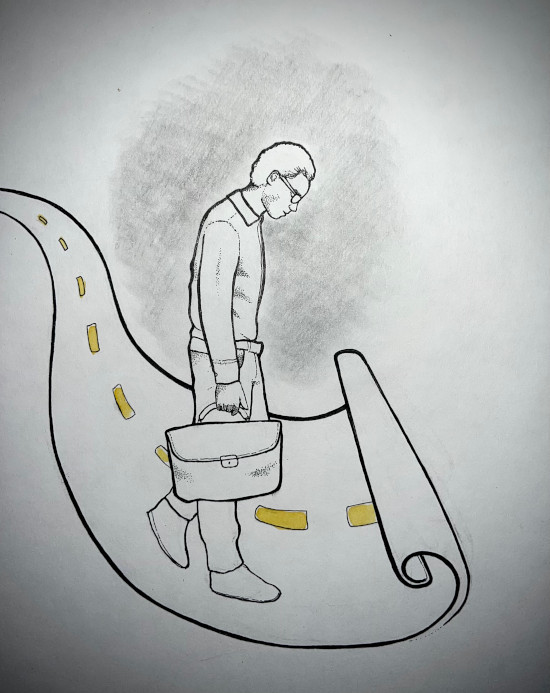Breaking through the Saint-Boniface ceiling
XO, the financial therapist

Illustration by Gabrielle Funk
I couldn’t wait to leave Saint-Boniface behind me when I was growing up. Yet I’m still very much nestled within its confines, not for want of trying.
I grew up in a French-speaking household and attended francophone elementary and high schools. Early on, the importance of retaining our language was drilled into us: if we were to stop speaking French, our culture would disappear. Like anything that’s forced upon a teenager, I rebelled and consumed mostly English-language books and films.
The Franco-Manitoban culture felt oppressive to me, for some reason. Belong, belong, I kept hearing it say. But I didn’t want to belong to anything. I just wanted to be me. I wanted to be swallowed up by the world, live in a too-big city where no one recognized me on the street.
I went as far as I could and attended grad school abroad. Immediately, a weight left my shoulders. I felt such freedom discovering who I was without the context in which I was born.
When I came back to Winnipeg, my community welcomed me back with open arms and took care of me. People gave me
work because they knew my family, because they’d seen me grow up and knew I was a good kid.
Slowly, since, my resumé has grown, one contract leading me to the next. But nearly all of that work has been within my community’s walls. It’s not something I want, and the bulk of my work being in French starts to worry me.
When I try to branch out and offer my services to the English-speaking world, I’m met with apprehension. Either they can’t go over my writing samples because they’re in French, or they don’t have a frame of reference for the contracts I’ve worked on. In an industry where it’s all about who you know, they don’t.
I’m frustrated. To be fully bilingual was supposed to be a career asset. And, sure, I’ve gotten a couple jobs that required bilingualism, but most were government ones. I had assumed living in an officially bilingual province and country meant that my work experience was interchangeable, but I was wrong.
I can see the Saint-Boniface ceiling from here, and I’m trying to break through it
– not just to live a life beyond its cultural confines, but to get more diverse work. The scale of the work available is limited, and I know that if I manage to branch out, to scale up, I can grow my career and my economic options, too.
I’m working on dream projects right now. Some are personal, funded specifically for francophones. Another is the biggest contract I’ve worked on in years. My community keeps me employed, and I can’t dismiss its unrelenting support.
I’m still pushing to break through to the anglophone side. But until then, I will keep gaining work experience with whoever gives it to me. It is not wasted time. Eventually, I know, when the time is right, those outside my community will take notice. This is not forever. This is just for now.
Elena Sturk-Lussier is a filmmaker with an MSc in creative writing and a penchant for romance novels.
Published in Volume 78, Number 19 of The Uniter (February 29, 2024)






